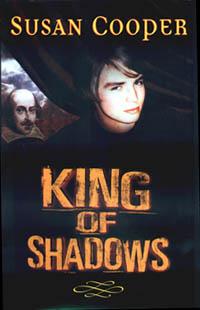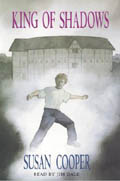



1999 - Nathan Field, a young actor from South Carolina has been chosen to play Puck in Shakespeare's 'A Midsummer Night's Dream'. This is not a normal production: 'The Company of Boys', formed by the enigmatic Arby, are to play at Shakespeare's Globe in London, a modern replica of the theatre that stood at Southwark, on the South Bank of the River Thames, four hundred years ago.
For Nathan, the theatre is a refuge, an escape from the haunting of his father's untimely death. He meets up with the company in Cambridge to begin rehearsals, and to make new friends. At last they head for London and the Globe, but after visiting the theatre for the first time, Nathan falls seriously ill. He is rushed to hospital and falls into a coma. Baffling doctors, he is placed in isolation with a suspected case of bubonic plague!
1599 - Nathan awakes to find himself in London, four hundred years before his own time. Here also, he is an actor, but an actor in the sixteenth century. He has to learn how to be a child of that time too. Nathan is to play in a brand new play by the popular playwright William Shakespeare. Indeed, such are his talents for tumbling, and for his knowledge of the script (learned four-hundred years in the future), he is chosen for the part of 'Puck'. But the biggest thrill is that he is to play alongside his hero - William Shakespeare.
Nathan finds new friendships and allegiances and enemies in the time before his birth. But the friendship that means the most to him, is the one he forms with Shakespeare himself. But will Nathan ever find his way back to his own time? Who is the shadowy figure in the audience in 1599? And who is the boy in the hospital bed in 1999 and why does he speak gibberish? And what part has Arby played in this adventure? Nathan must look to his friends in the past and the future to find answers, and the strength to face and deal with his emotions.
![]()
This past year I visited the United States to visit Susan and to renew friendships friendships at Children's Literature New England. When I arrived in New York, a present awaited me - a preview copy of 'King of Shadows', along with a scribbled note. I spoke to Susan on the phone.
"Do you mind if I read it," I asked.
"Of course not," Susan replied.
A day or so later I had finished the novel, and very special I felt too. One of very few to have
read the new story. I rang Susan again:

"I loved King of Shadows!" I enthused.
"Oh thank goodness!" The voice at the end of the phone said. "I am so pleased that I got it right!"
Over the next few days I was to find out more about the book, and Susan showed me the cover proposed for the UK edition. Later at CLNE, I heard how she had hatched the idea for the book well before she had heard about or even seen 'Shakespeare in Love'! ("I could murder Tom Stoppard!" she joked.)
"I had a flicker of an idea," she said in a later interview, " that I would like to write about a boy who is acting at the new Globe and finds himself going back in time to act at Shakespeare's Globe. But I thought, 'Oh, God, all that research!' I had just finished The Boggart, and the [main character] hadn't quite left my head, so instead of doing my Elizabethan boy, I wrote a sequel. But the Elizabethan boy didn't leave my head either. So then I did bite the bullet."
I think that King of Shadows is Susan Cooper's finest work since the Dark Is Rising books, and I think her enthusiasm shines through. Feeling this, I was so pleased to find out that Susan did indeed love writing the book.
" I was terribly sad when I had to leave Shakespeare, I had more pleasure from writing King of Shadows [than any other work]," she acknowledges. "It kept giving me things back."
(Interview excerpts from Publishers Weekly, 1999)